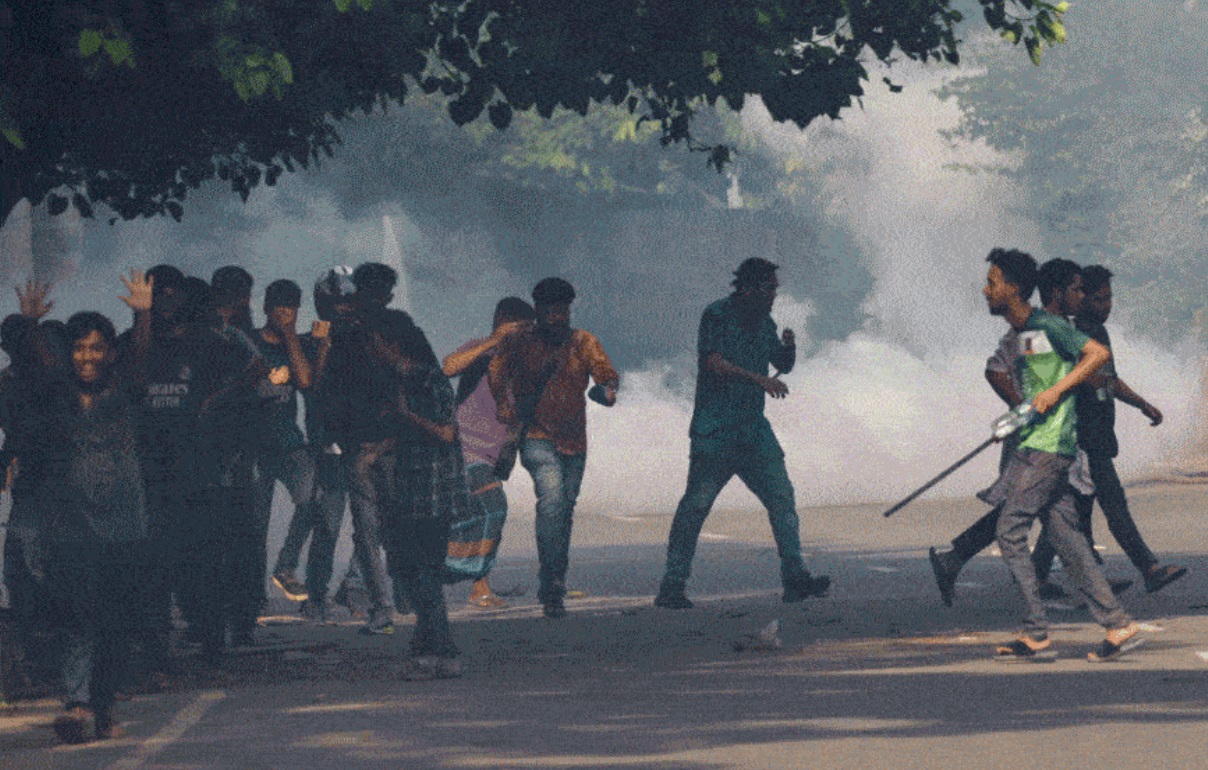Massive protest Anti reservation of seats paralyses Bangladesh, 6 students killed.
Table of Contents
ToggleAnti-reservation protests in Bangladesh
Anti-reservation activists have called for an all-out blockade on Thursday to protest the incident.
Six people were killed on Tuesday in clashes between anti-reservation protesters and police and members of the ruling Awami League’s student wing in three Bangladeshi cities – Dhaka, Chittagong and Rangpur.
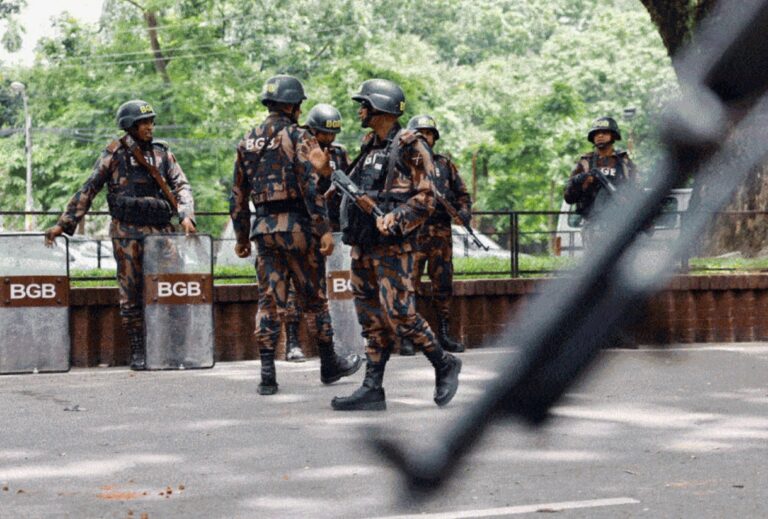
On Wednesday, all colleges and universities were declared “closed indefinitely” and students were asked to vacate campuses and hostels. But police faced resistance on Wednesday when they tried to evacuate various educational institutions, including Dhaka University.
The protesters blocked the Dhaka-Chattogram highway at Shani Akhra area after police forcibly vacated the Dhaka University campus. There was a clash at night. A toll plaza and a police kiosk at a nearby flyover were set on fire.
Indiscriminate vandalism and even pedestrian vehicles were allegedly attacked. At that time, the police resorted to the use of force to control the situation. Tear gas, sticks, sound grenades and pellets were allegedly fired.
Local Jatrabari Police Station police officer told Prothom Alo that local BNP and Jamaat-e-Islami activists took part in the attack using the students as shields.
On the other hand, police personnel clashed with the protesting students of Rajshahi University when they tried to free the vice-chancellor.
In fact, in 2018, Bangladesh was rocked by the anti-reservation movement. In Bangladesh, 56 percent of the total recruitment in government jobs was reserved and 44 percent was reserved for the general public.
Of the 56 percent, 30 percent were reserved for relatives of freedom fighters, 10 percent for women, 10 percent for different districts, 5 percent for tribals and 1 percent for the disabled.
In 2018, following the outbreak of the anti-quota movement, Prime Minister Hasina issued an order abolishing 30 percent reservation for the relatives of freedom fighters, 10 percent for women and 10 percent in the district sector.
Only 5 per cent reservation was given to tribals and 1 per cent to the disabled. At that time, the students ended the movement.
But relatives of seven freedom fighters moved the High Court in 2021 challenging the legality of the 2018 reservation cancellation order.
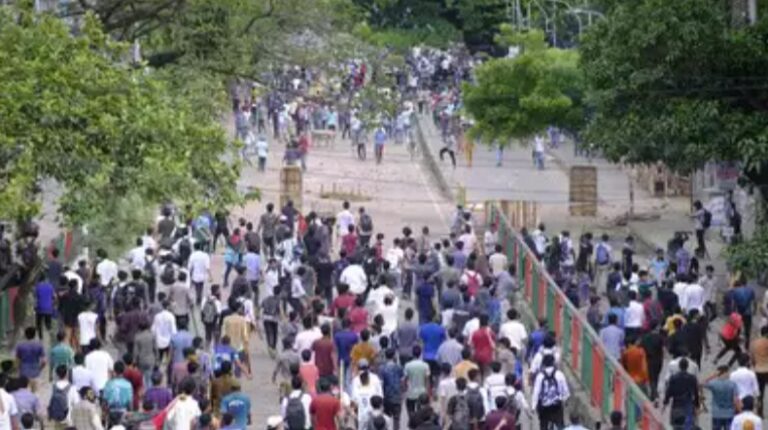
On June 5, the High Court declared the Hasina government’s order illegal. The cancellation of the order means the return of reservation as before. The students again protested.
They demanded that all types of quota system should be abolished from permanent government appointments. Meanwhile, the Hasina government has appealed to the Appellate Division of the Supreme Court against the High Court verdict.
On July 10, a five-member bench of the Appellate Division, headed by Chief Justice Obaidul Hassan, stayed the matter for a month.
The next hearing of the case will be on August 7. The apex court’s stay order on the matter, including the High Court verdict, upholds the government’s order in 2018.
That is, three types of reservation, including the relatives of freedom fighters, did not rule in government jobs.
But the anti-reservation movement, the anti-discrimination student movement, is now launching a new movement demanding the cancellation of tribal reservation.
It has also been alleged that the hardline party Jamaat-e-Islami is behind this. “I declare unequivocally that steps will be taken so that those who carried out killings, looting and terrorist acts, whoever they are, get proper punishment,” Hasina said on Wednesday. ’’
Terrorist conspiracy to incite students- PM Hasina
“I am unequivocally announcing that measures will be taken so that those who carried out killings, looting and terrorist acts, whoever they are, they will get proper punishment,” she said in an address to the nation on state TV and radio on Wednesday evening. ’’
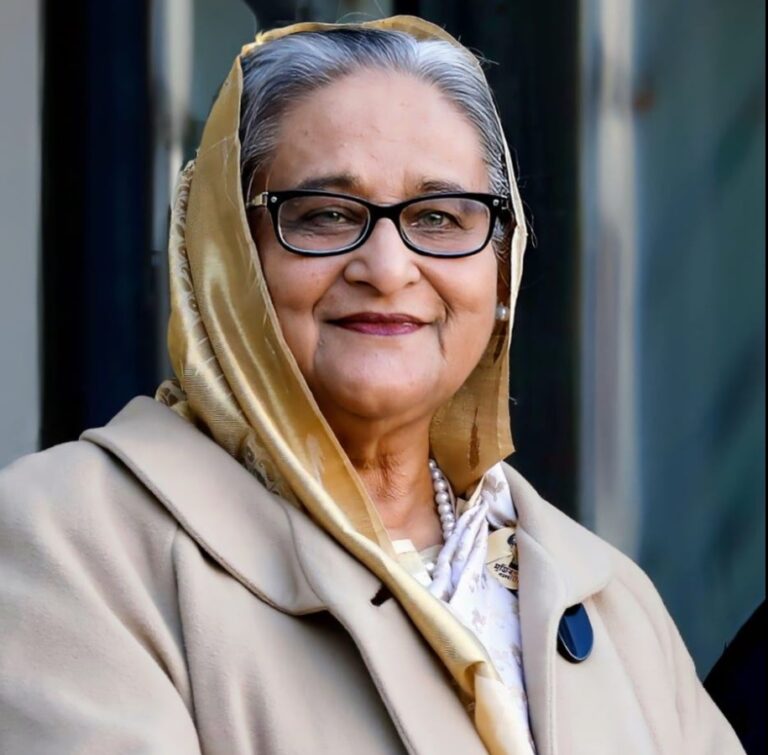
The prime minister also expressed grief over the deaths of six people during the anti-reservation movement. “Terrorist activities have started taking advantage of the quota movement.
As a result, what happened in the movement of soft-minded students is very painful and sad. How many precious lives were lost unnecessarily. Condolences to their families. He also announced a judicial inquiry into the deaths.
In fact, the student-youth movement in Bangladesh is surrounded by the demand for the cancellation of the reservation system for recruitment in government jobs.
At least six people were killed in clashes between protesters and police in different parts of the country, including the capital Dhaka, on Tuesday. Prime Minister Sheikh Hasina’s Awami League’s student wing also allegedly attacked the protesters.
Bangladeshi newspaper Prothom Alo reported that three people were killed in Chittagong. Two in the capital Dhaka and one in Rangpur.
It is also alleged that rubber bullets were fired on an anti-reservation student-youth procession in Muradpur area of Chittagong on Tuesday afternoon.
A local leader of Jatiyatabadi Chhatra Dal, the student wing of the opposition BNP, was killed there. On the other hand, an activist of Hasina’s party’s Chhatra League, the student wing of Hasina’s party, was beaten to death in Dhaka.
Unrest was reported from the capital Dhaka as well as from Barisal, Sylhet and Comilla on Wednesday. Various educational institutions in the country, including Dhaka University, have been closed for an indefinite period to prevent clashes.
Police obstruct protesters from vacating the Dhaka University campus. There were clashes in phases. Police used tear gas and sound grenades, Bangladeshi media Prothom Alo reported. Three protesters were arrested for throwing brickbats at police at Chittagong University.
6 killed in clashes with police during anti-reservation protests in Bangladesh
At least six people were killed in clashes between protesters and police in different parts of the country, including the capital Dhaka, on Tuesday. Prime Minister Sheikh Hasina’s Awami League’s student wing also allegedly attacked the protesters.
Bangladeshi newspaper Prothom Alo reported that three people were killed in Chittagong. Two in the capital Dhaka and one in Rangpur.
On Tuesday afternoon, shots were fired at an anti-reservation student-youth procession in Chittagong’s Muradpur area.
Mohammad Wasim, secretary of Chattogram unit of Jatiyatabadi Chhatra Dal, the student wing of the opposition BNP, was killed in the attack.

On the other hand, two protesters were killed in a clash between the agitating students and activists of Jubo League and Chhatra League in the capital’s Dhaka College and Science Lab areas.
The acting assistant commissioner of police said the identities of the deceased could not be ascertained. In fact, in 2018, Bangladesh was rocked by the anti-reservation movement.
In Bangladesh, 56 percent of the total recruitment in government jobs was reserved and 44 percent was reserved for the general public.
Of the 56 percent, 30 percent were reserved for relatives of freedom fighters, 10 percent for women, 10 percent for different districts, 5 percent for tribals and 1 percent for the disabled.
In 2018, following the outbreak of the anti-quota movement, Prime Minister Hasina issued an order abolishing 30 percent reservation for the relatives of freedom fighters, 10 percent for women and 10 percent in the district sector.
Only 5 per cent reservation is given to tribals and 1 per cent to the disabled. At that time, the students ended the movement.
But relatives of seven freedom fighters moved the High Court in 2021 challenging the legality of the 2018 reservation cancellation order. On June 5, the High Court declared the Hasina government’s order illegal.
The cancellation of the order means the return of reservation as before. The students again protested. They demanded that all types of quota system should be abolished from permanent government appointments.
Meanwhile, the Hasina government has appealed to the Appellate Division of the Supreme Court against the High Court verdict.
On July 10, a five-member bench of the Appellate Division, headed by Chief Justice Obaidul Hassan, stayed the matter for a month. The next hearing will be on August 7.
The apex court’s stay order on the matter, including the High Court verdict, upholds the government’s order in 2018. That is, three types of reservation, including the relatives of freedom fighters, did not rule in government jobs.
But the anti-reservation movement, the anti-discrimination student movement, is now launching a new movement demanding the cancellation of tribal reservation. It has also been alleged that the hardline party Jamaat-e-Islami is behind this.
Bangladesh student protest: 3 more killed in Dhaka violence, Hasina’s message of discussion
At least three people were killed in clashes between protesters and police and paramilitary forces on Thursday. The number of injured is hundreds. Meanwhile, Bangladesh Prime Minister Sheikh Hasina’s government has invited the protesters for talks.
Bangladeshi media ‘Prothom Alo’ reported that two protesters were killed in clashes with police in Uttara area. On the other hand, a pedestrian was beaten to death during a disturbance in Badda area.
The man was a minibus driver by profession. Several policemen were seriously injured in the counter-attack by the protesters. In the last three days, nine people have died in the anti-reservation movement in Bangladesh.
Some policemen take shelter in a room of Canadian University of Bangladesh in Merul Badda to escape the attack by violent protesters. A helicopter had to be called down to rescue them.
Mahmudul Hasan, a doctor at Uttara Crescent Hospital, told reporters that more than 400 protesters were injured and undergoing treatment at their hospital. One of them has died. His identity could not be confirmed.
Law Minister Anisul Huq invited the anti-reservation protesters to a discussion at a press conference on Thursday.
Anisul claimed that the Hasina government supports the demands of the protesters on policy issues. “We also agree in principle to reform the current quota system.
The Prime Minister has given me and Education Minister Mohibul Hasan Chowdhury the responsibility to discuss with the students. We will sit with them. Whenever they (students) want to sit, if it is today, we are ready to sit today. ’’
‘Don’t step out of your homes now’ Modi govt warns Indians living in Bangladesh
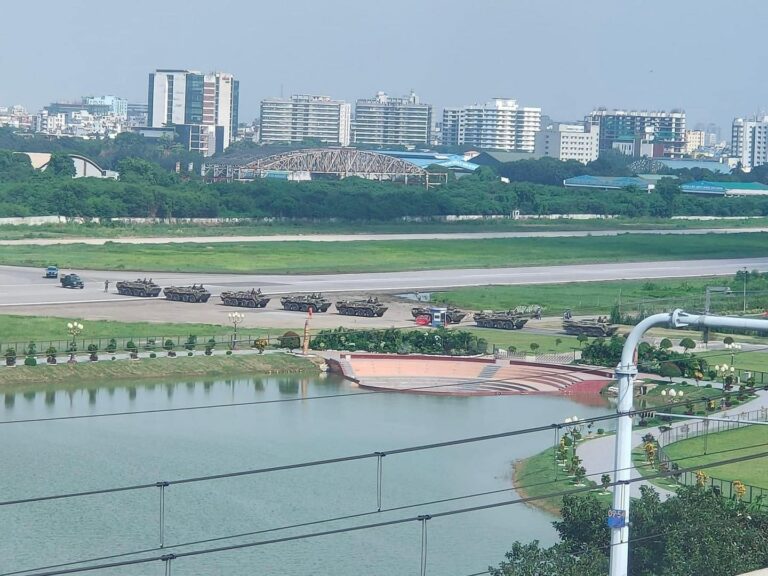
Indian citizens and students in Bangladesh have been asked to “avoid travel” and “control the movement of their homes”.
They have also been advised to contact the High Commission of India in Dhaka and the Deputy High Commissions in Chittagong, Rajshahi, Sylhet and Khulna on phone and WhatsApp if required.
Bangladesh has been virtually paralyzed since Thursday morning due to the ‘complete shutdown’ program of the anti-reservation students and youths.
Various cities of the country, including the capital Dhaka, have taken the form of a shutdown on Thursday. At the same time, dharnas, blockades, demonstrations are going on in different areas.
Six people were killed in the violent protests on Tuesday. After that, there were clashes in different districts including Dhaka till late Wednesday night. In this situation, New Delhi is concerned about the safety of Indian citizens.
Bangladesh under ‘all-out blockade’, BNP targets police to suppress anti-reservation movement
Various cities of the country, including the capital Dhaka, have taken the form of a shutdown on Thursday. Except for hospitals, media and emergency services, almost all private offices, shops and markets are closed.
The protesters are observing an ‘all-out blockade’ on Thursday protesting the deaths of students in the attack by police and paramilitary during the peaceful movement of anti-reservation students.
Demanding the trial of the killers, ensuring a terrorism-free campus and ending the conservation system. Due to their protests, the public transport system of Bangladesh has come to a standstill.
Thousands of vehicles are stranded on national highways. The presence of vehicles other than police cars and ambulances on the streets of the capital Dhaka is nominal. However, the protesters continue to blockade.
Asif Mahmud, one of the coordinators of the Anti-Discrimination Student Movement, a joint platform of anti-reservation protesters, called for a ‘complete shutdown’ on Wednesday night to protest police repression and attacks by the ruling party.
Within hours, its impact was visible across the country. In the meantime, Prime Minister Sheikh Hasina’s government has been active in suppressing the movement.
A team of Dhaka police raided the headquarters of the main opposition BNP on Monday night. Prothom Alo, quoting Dhaka police sources, said various local and foreign weapons, including bombs, petrol and sticks, were recovered from the office in Naya Paltan area.
Six people were killed on Tuesday in clashes between anti-reservation protesters and police and members of the ruling Awami League’s student wing in three Bangladeshi cities – Dhaka, Chittagong and Rangpur.
On Wednesday, all colleges and universities were declared “closed indefinitely” and students were asked to vacate campuses and hostels.
But police faced resistance on Wednesday when they tried to evacuate various educational institutions, including Dhaka University.
The protesters blocked the Dhaka-Chattogram highway at Shani Akhra area after police forcibly vacated the Dhaka University campus. There was a clash at night.
A toll plaza and a police kiosk at a nearby flyover were set on fire. Indiscriminate vandalism and even pedestrian vehicles were allegedly attacked.
At that time, the police resorted to the use of force to control the situation. Tear gas, sticks, sound grenades and pellets were allegedly fired.
A police officer of Dhaka’s Jatrabari Police Station told Prothom Alo that local BNP and Jamaat-e-Islami activists took part in the attack using the students as shields.
On the other hand, police personnel clashed with the protesting students of Rajshahi University when they tried to free the Vice Chancellor.
“I declare unequivocally that measures will be taken so that those who carried out killings, looting and terrorist acts, no matter who they are, get proper punishment,” Hasina said on Wednesday. ’’
Sheikh Hasina’s government orders indefinite closure of Dhaka University
The student-youth movement is increasing in Bangladesh demanding the cancellation of the reservation system in government jobs.
At least six people were killed in clashes between protesters and police in different parts of the country, including the capital Dhaka, on Tuesday.
The unrest continued on Wednesday. This time, the protesters vandalized the office of Bangladesh Chhatra League (BCL) of Dhaka University. Sheikh Hasina’s government is thinking about how to disarm these protesters.
Several representatives of the Bangladesh government say that the government will not hesitate to take strict steps to suppress the movement. However, the government is ready to sit for talks if the protesters want.
Quoting several representatives of Sheikh Hasina’s party Awami League and the government, Prothom Alo reports that the ongoing movement in the country has now turned into a movement to oust the government.
Various political parties are instigating this movement. That is why there is no room for the government to go soft to pacify the movement. The work of stopping the movement with a heavy hand has begun.
However, the government is willing to sit for talks if the protesters want. The government has even initiated talks with the government. However, there was no word from the protesters.
The atmosphere centered on the student-youth movement in different parts of the country including Dhaka.
Prothom Alo reports that various precautions have been taken in Dhaka University as well as other universities of the country.
Several universities, including Shahjalal University of Science and Technology in Sylhet, have decided to close for an indefinite period. On the other hand, Dhaka University has become heated since Wednesday morning.
According to Prothom Alo, clashes between the protesting students and BCL activists on the campus on Tuesday night sparked fresh tension on the campus.
It is alleged that several BCL leaders were thrown out of the room reserved for them. Even vandalism was carried out there. They have taken initiative to depoliticize different areas of the campus. Signature collection is underway.
In fact, in 2018, Bangladesh was rocked by the anti-reservation movement. In Bangladesh, 56 percent of the total recruitment in government jobs was reserved and 44 percent was reserved for the general public.
Bangladesh was also heated at that time demanding the cancellation of that reservation. However, the government was able to stop the movement like then.
The legal battle begins. Relatives of seven freedom fighters moved court in 2021 challenging the legality of the 2018 reservation cancellation order.
On June 5, the court declared the Hasina government’s order illegal. After that, a section of students and youth again went on the path of movement.
The Hasina government has already appealed to the Supreme Court of Bangladesh.

